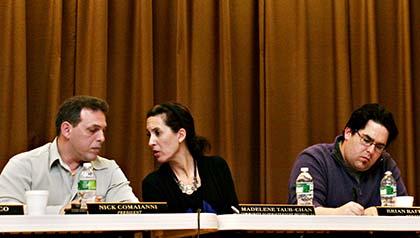By Joe Anuta and EVELYN CHENG
Voter turnout for May’s community education council elections was less than 25 percent, but the lack of candidates also pointed to a dismal overall participation rate.
The city Department of Education could not comment on the exact number of parents who ran for election, but the DOE said there were fewer candidates than in previous years.
The decrease came despite the fact that more people could run: the DOE allowed officers of the parent associations and parent-teacher associations to seek spots for the first time this year.
Still, several regions did not have a sufficient number of candidates.
“We had just barely enough, nobody extra running,” said District 24 CEC President Nick Comaianni.
State law also requires that two of the nine council members be parents of children in the individualized education program and English language learners program, respectively.
But due to language barriers, many parents of English language learner children know little about their school’s CEC, leaving many districts without an ELL representative and only eight council members.
Only six of 35 districts have ELL parents on their CECs, and three districts lack both IEP and ELL parent members.
Both CEC members and government officials attribute the low participation rate to the recent transfer of power from local districts to a central board controlled by the mayor.
“Parents feel frustrated because they don’t really have a say in the way things should be run,” said City Councilman Daniel Dromm (D-Jackson Heights), who serves on the Council Education Committee.
Despite the apparent lack of influence, Dromm said parents can still make a difference in their children’s education if they put their mind to it.
But many CEC presidents, including Isaac Carmignani co-president of District 30 CEC, said a lack of planning by the DOE is to blame.
“From the beginning the outreach was paltry. It was minimal,” he said. “Everything about it was an afterthought.”
And some parents like Kathryn Thome, who has served on District 28 CEC for four years, was first told that she could run, elected, but then told she was disqualified.
Carmignani and several other of the CEC presidents coordinated with the borough presidents to launch a task force to investigate the elections and are compiling a report.
In essence, the force believes that the DOE should not run the elections due to a conflict of interest.
“You have a lot of parents that believe the DOE doesn’t want a parent voice,” he said. “They’re basically electing the guy that can tell them what to do.”
On the other hand, for the first time, the DOE is offering a survey using $2 million from the federal stimulus act for parents to express their concerns and how the department might communicate with families more effectively. The survey is available in print at district offices and online at familyfeedback.org until July 25.
Reach reporter Evelyn Cheng by phone at 718-260-4524.


































